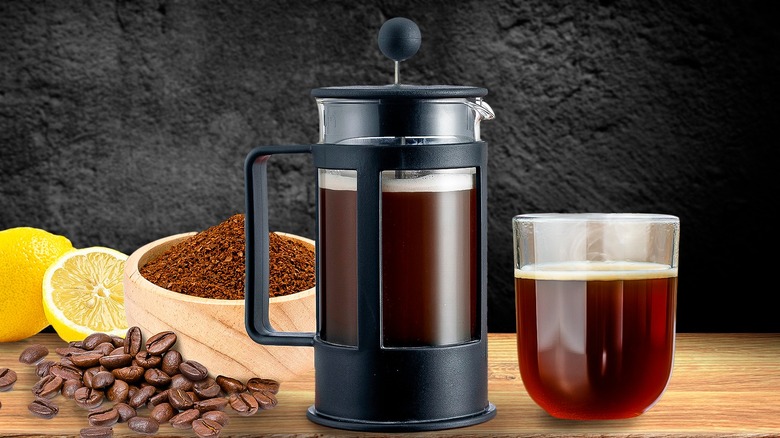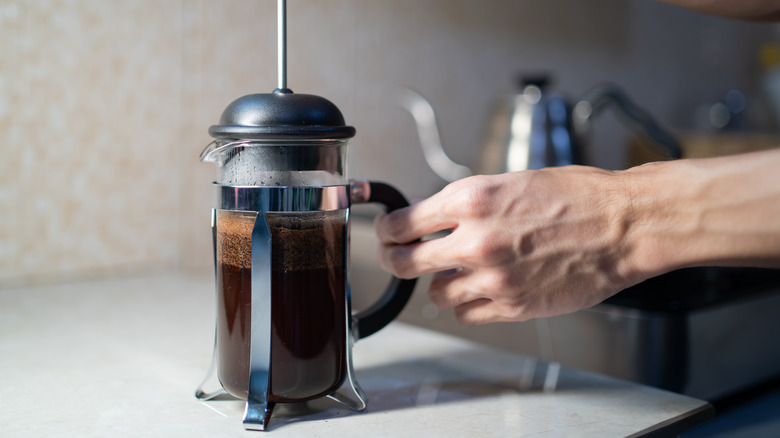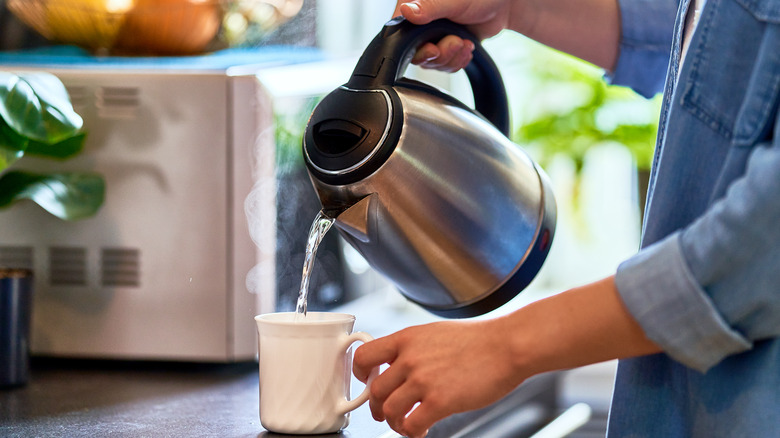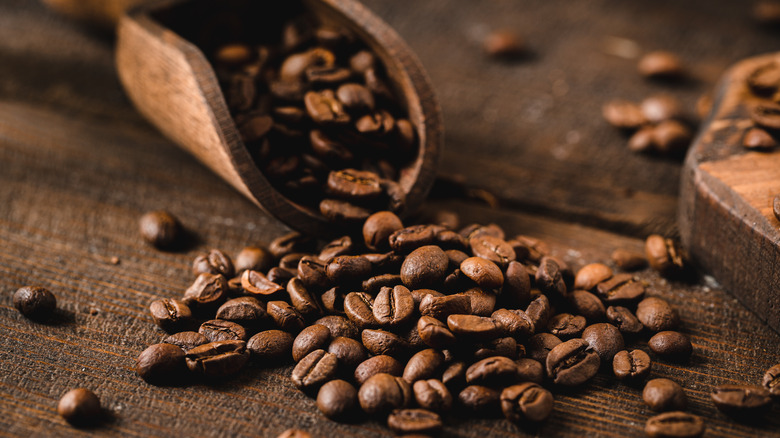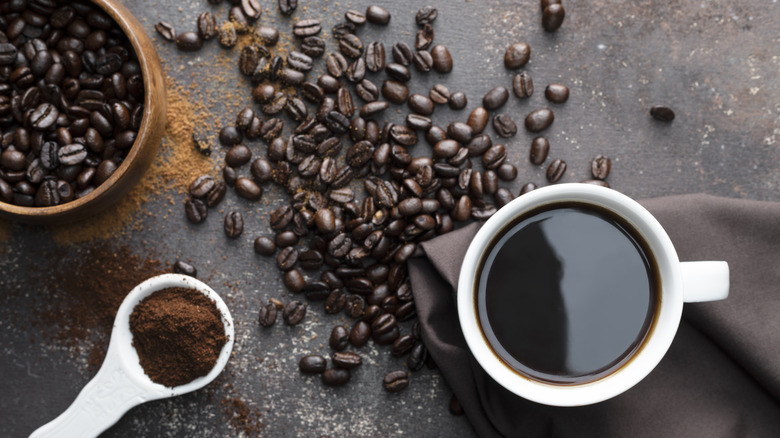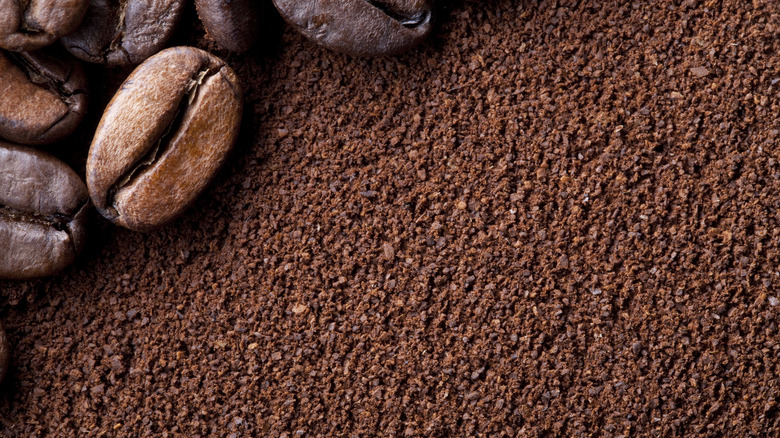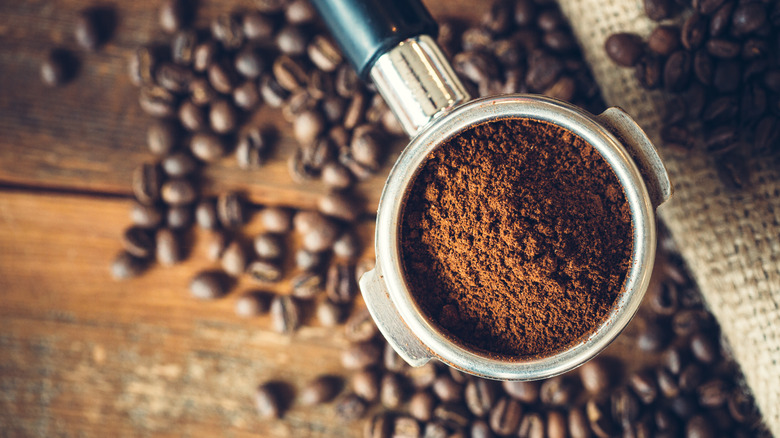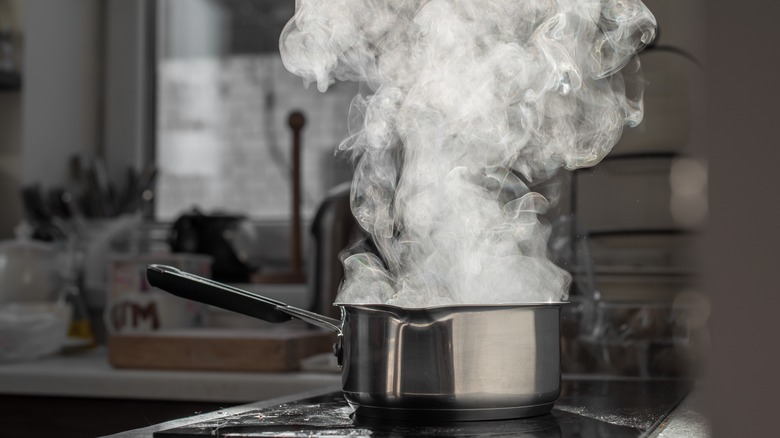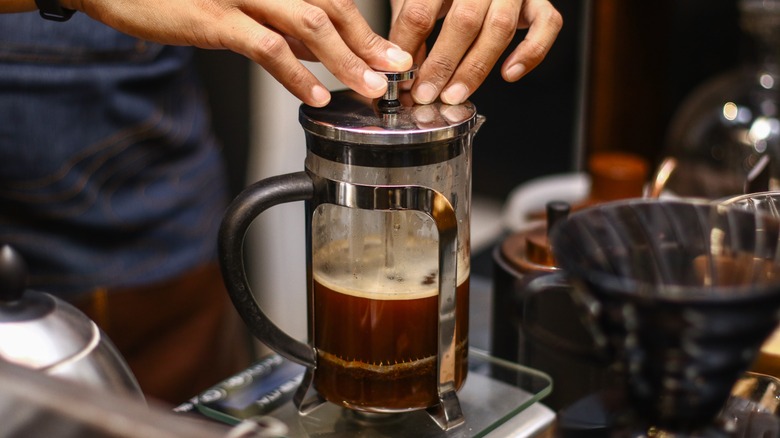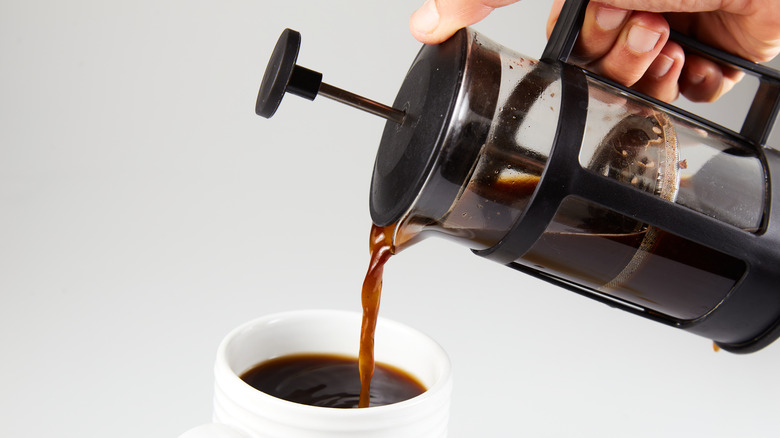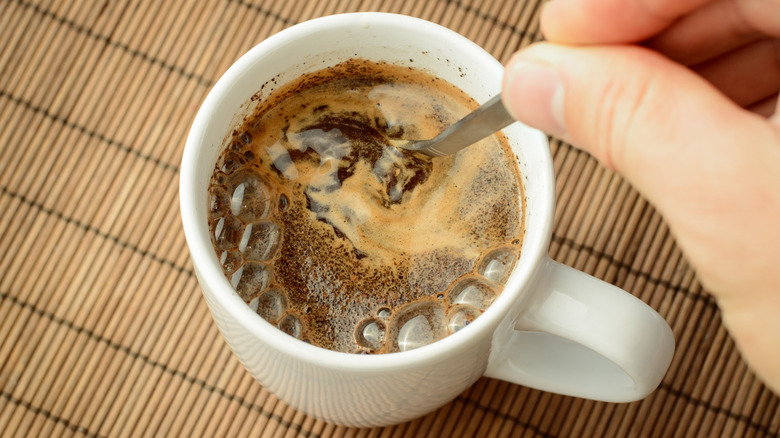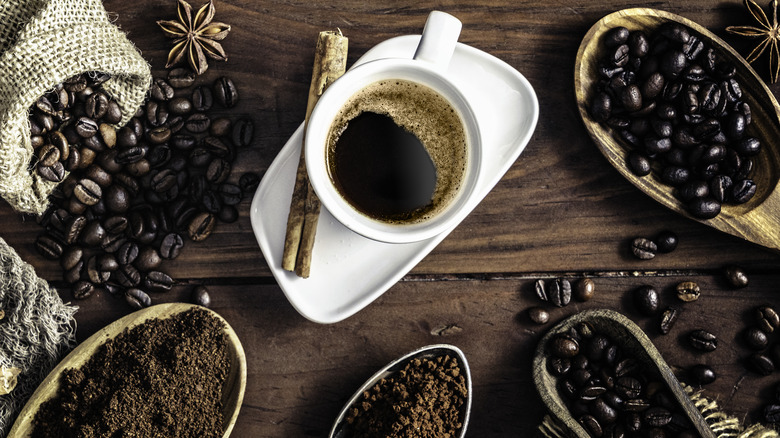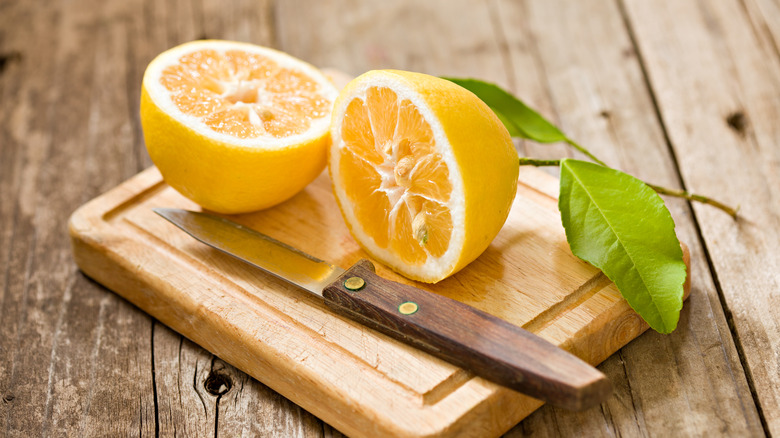12 Ways To Add More Flavor To French Press Coffee
The French press is an ideal way to achieve rich, flavorful coffee. Because the brewing process is manual, using a French press allows you to adjust everything about the way you brew your coffee. If you're trying to ace brewing the perfect strength and flavor of your favorite roast, a French press is the way to go.
The French press — also known by its original name, a cafetière — was first created in the 1850s. Its popularity first spiked in the mid-1950s, and it's still widely popular today as an easy way to create a flavorful home coffee brew. Though using a French press isn't a time-consuming task, it can take a few tries to figure out all the best ways to make the perfect cup of coffee. If you're brewing up a weak cup each morning and wondering where you might be going wrong, here are a few ways to improve the strength and flavor of your French press coffee.
Longer brewing time
One of the simplest ways to increase a pressed coffee's flavor is by brewing it longer. If your coffee is too weak (and the blend isn't bitter), you might achieve better flavor by leaving the coffee in the press for longer. Four to five minutes is typically the sweet spot; this will allow the oils from the coffee to fully release without over-brewing your coffee grounds.
However, if you're truly trying to get maximum strength out of your coffee, some French press fans swear by leaving their coffee to brew from six minutes all the way up to eight minutes instead. This can sometimes help coax extra flavor out of stubborn roasts. We'd recommend you try five minutes a few times first because brewing your coffee for too long can make it bitter. You can test for the ideal brewing time by first brewing a cup for four minutes and then increasing it by one minute each time afterward.
Using less water
The water-to-coffee ratio in a French press can also contribute to loss of flavor. If you're using too much water (or too few beans) for the amount of coffee you're trying to brew, you'll only end up with a weak cup of coffee. Decreasing the amount of water you're using (or increasing the amount of ground coffee) can help you get more flavor out of your coffee.
If you're planning to brew a larger amount of coffee, adding more grounds will help you achieve the flavor you're looking for without decreasing the amount of coffee you're making. But French presses are best known for creating a single cup of coffee at a time, so decreasing the water before using up more grounds might be the best way to go. Just keep in mind that coffee grounds will soak up water as they brew; there's plenty of advice out there regarding the 'golden ratio' for French presses, but it will all depend on the size of your machine and the strength you're looking to achieve. Typically, about a 1:12 to 1:15 coffee-to-water ratio is a good point of reference; if you know you want a stronger brew, start with 1:12.
Check your beans
If your coffee beans are stale, your brew will be weak. Fresh coffee beans have plenty of natural oils on them; these oils slowly release into the water they're brewed with, creating a strong, flavorful coffee. Over time, however, these oils will dry up, and your coffee beans (or grinds) won't release the same amount of flavor as they once did when brewed — this is why you shouldn't be grinding your coffee beans too far in advance.
Once you've opened up a package of coffee beans, they'll typically last for a few weeks at most, while coffee grounds can actually max out at a week. If you've tried using more beans and are still brewing unusually weak coffees, you should replace your coffee beans with a new batch. Make sure you check your coffee's shelf life, too, as different coffee houses may have different recommendations. If your beans are still going stale early, check how you're storing them. An airtight container will help keep your beans fresh for longer.
Choose dark roasts
Many fans of the French press tend to argue that dark roast is what the French press was made for, not light or medium roasts. In the end, it's true that light or medium roasts can only provide so much strength. If you're looking for the strongest brew possible, the issue could be with the beans, not the French press. Opting for a dark roast can intensify the flavor of your French press coffee.
If you're not a fan of super-strong coffees, opting for a medium rather than a light roast could still give you more flavor without overwhelming you. Lighter roasts can certainly be less intimidating, although you might want to play around with shorter brewing times for darker roasts to achieve a better flavor. If you're a dedicated light roast fan, though, don't give up hope just yet — there are more things to try with your French press to add a little flavor to lighter brews.
Under-grinding beans
Even some coffee fanatics make the mistake of thinking that super-coarse roasts are always going to achieve the strongest brew. This isn't always true, even for the French press, because extremely coarse grounds will take much longer to release their flavor than other sizes of grinds. When your grinds are too coarse, the oils from the coffee beans won't fully release within the few minutes you brew your coffee. This means that you could be missing out on getting the most from your beans just because of their grind size.
Remember, that doesn't mean you can make up for under-grinding your beans by brewing them for longer, either, as this will also cause them to become more bitter — the worst of both worlds. If you're going off the five-minute brewing time but you haven't ground your coffee beans enough, your French press coffee will still come out weak.
Over-grinding beans
Got a little overzealous with your coffee grinder? Not only will the flavor of your coffee taste off, but your coffee might also end up with grounds in it. Extra-fine grounds are great for some kinds of coffee machines, but the French press is a brewing style that requires coffee grounds on a larger scale. This will ensure that no coffee grounds can make it through the filter after your coffee is done brewing.
So, how should you be grinding your coffee for a French press? French press coffee uses course grounds; many coffee guides compare the size, of course, coffee grounds to sea salt (the flaky kind, not table salt). If you're uncertain about your own coffee grinding skills, you can always purchase pre-ground coffee from a coffee house or shop instead; packs of ground beans will typically come with recommendations for which brewing method to use based on the type of ground.
Water temperature
Everybody loves a good hot coffee, but if you were thinking you'd save time waiting for your coffee to cool down by adding cool water to your French press, you're missing out on extracting the most flavor from your beans. Even warm water won't do the trick; this isn't exclusive to the French press, but coffee is best brewed within a ten-degree temperature range to ensure the most flavor is extracted from your coffee grounds. The best water temperature for brewing coffee is right around 200 degrees Fahrenheit. This can be achieved using a thermometer to measure the exact temperature or by bringing water to a boil separately before using it to brew. If you're planning on the latter method, remove the water from heat as soon as it boils so you can get as close to 200 degrees Fahrenheit as possible; you may want to let it sit for a little under a minute before using it to make sure it's the right temperature. Be careful — if your water is too hot (above 205 degrees Fahrenheit), you'll only get extra bitterness, not extra flavor.
Go slowly
Pressing down the French press is probably the most fun part of the entire brewing process. But there's a reason it's not called a French slam, so you'll need to be nice and gentle when you're pushing down the top of your press. Too much force could slightly over-extract the coffee grounds and ruin the flavor of your French press. Plus, depending on the machine you're using, pushing down the filter too quickly will allow grounds to sneak through and into your coffee. To get the best flavor, press down slowly so that you're not disturbing the grounds or liquid in the press.
One other mistake with pressing down the filter could be that you're pressing it down too early. Although the process of pushing down the French press' plunger is a slow one, that shouldn't change the amount of time you're brewing your coffee. Wait until your brewing time is up before slowly pushing down the filter.
Clean your French press
Okay, you're probably (hopefully) not leaving old coffee grounds to sit in your French press each time you brew (if you are, that's definitely affecting the taste of your coffee). There are plenty of ways to clean a French press, with the most common one being to fill up the carafe with soap and water and plunge the filter in to clean it. For a daily clean, that's more than enough. But coffee oils can slowly build up over time — even if you're using the same roast every day; these oils will eventually go rancid and affect the taste of your brew. As you continue brewing in an oily machine, you'll be allowing your fresh brews to soak up the old oils. This can cause your coffee to turn bitter even with low brewing time, changing the flavor of your cup.
A deep clean of your French press will likely be necessary after every few uses, so don't let it sit too long without taking it apart and thoroughly cleaning each part of the press. If it's dishwasher-safe, you won't have to worry about doing this. Otherwise, you should take apart the plunger and hand-wash it before air-drying it, and do the same thing with the pitcher. You might even want to soak the French press components in food-safe cleaning solution to make sure they're clean.
Mix things up
Coffee grounds slowly soak up water as they brew, but when they're first immersed in water, some of the grounds may float for a little while before sinking to the bottom of the water they're brewing in. If you're not giving your coffee grounds a good stir within the first minute you brew, you might be missing out on a lot of their flavor. Grounds that are fully immersed in the water will release more flavor into the water instead of just sitting on top, where they can get stuck together. You should stir your French press grounds around a little bit while your coffee brews can help them separate faster, ensuring that you're not missing out on extracting the most flavor during your brewing time. Once you've seen that all the coffee grounds have fallen to the bottom of the water they're brewing in, you can sit back and relax while your coffee brews.
Add spices
One popular way to achieve flavor in a French press — even if it's not a part of the coffee's original flavor profile — is to add a few spices to the coffee grounds while they're brewing. Spices can help elevate the flavor of your coffee, and adding them before brewing helps diffuse the spices into the coffee, enhancing the flavor of the batch. It's especially popular amongst those who are looking to offset naturally bitter coffee beans or create new flavor profiles for their morning coffee.
There are plenty of spices that will work well with coffee, although this can also vary depending on the flavor profile of the roast you're using. Cinnamon, cocoa powder, cloves, or ginger are some popular spices to add to a French press. Generally speaking, if you'd use it to bake with, it will probably work well in your coffee. You can also check the flavors already present in your roast to use as a guide for which spices to add. Cinnamon will bring out citrusy flavors, while star anise might complement fruitier roasts.
Citrus rinds or oils
Lemon is known for bringing out coffee's natural flavor, as is orange. If you're able to add lemon or orange peels to your coffee grinds the next time you opt for a French press brew, you might achieve a more balanced flavor. The great thing about adding citrus to your coffee is that it works to bring out flavors in all types of roasts; lighter roasts will typically have a good flavor match for citrus, while citrus will also help to bring out the strength of a good dark roast.
French presses are actually commonly used to make fruit juices and infused water when they're not being used for coffee. To get the most out of your citrus peels, you can add them to your coffee brew before you press down the plunger. Once the filter is pressed on top of the peels, it will extract the oils from the rinds and release them into your coffee. You can also brew the citrus rinds with your coffee grounds before pressing down the plunger. Just don't overdo it, or the citrus taste will overwhelm the notes of your coffee blend.
